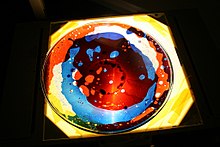Psych-rock
| Psychedelic rock | |
|---|---|

Liquid oil projections: a popular visual accompaniment for live psychedelic rock performances
|
|
| Stylistic origins | |
| Cultural origins | Mid-1960s, United States and United Kingdom |
| Typical instruments | |
| Derivative forms | |
| Subgenres | |
| Fusion genres | |
| Regional scenes | |
| Local scenes | |
| Other topics | |
Psychedelic rock is a diverse style of rock music inspired, influenced, or representative of psychedelic culture, which is centred around perception-changing hallucinogenic drugs. Psychedelic rock is intended to replicate and enhance the mind-altering experiences of psychedelic drugs, most notably LSD. Many psychedelic groups differ in style, and the label is often used indiscriminately.
Originating in the mid-1960s among British and American musicians, the sounds of psychedelic rock invokes three core effects of LSD: depersonalization, dechronicization, and dynamization; all of which detach the user from reality. Musically, the effects may be represented via novelty studio tricks, electronic or non-Western instrumentation, disjunctive song structures, and extended instrumental segments. Some of the earlier 1960s psychedelic rock musicians were based in folk, jazz, and the blues, while others showcased an explicit Indian classical influence called "raga rock". In the 1960s, there existed two main variants of the genre: the whimsical British pop-psychedelia, and the harder American West Coast acid rock. While "acid rock" is often deployed interchangeably with the term "psychedelic rock", it can also refer more specifically to the heavier and more extreme ends of the genre.
The peak years of psychedelic rock were between 1966 and 1969, with milestone events including the 1967 Summer of Love and the 1969 , becoming an international musical movement associated with a widespread counterculture before beginning a decline as changing attitudes, the loss of some key individuals and a back-to-basics movement, led surviving performers to move into new musical areas. The genre bridged the transition from early blues- and folk-based rock to progressive rock and hard rock, and as a result contributed to the development of subgenres such as heavy metal. Since the late 1970s it has been revived in various forms of neo-psychedelia.
...
Wikipedia
